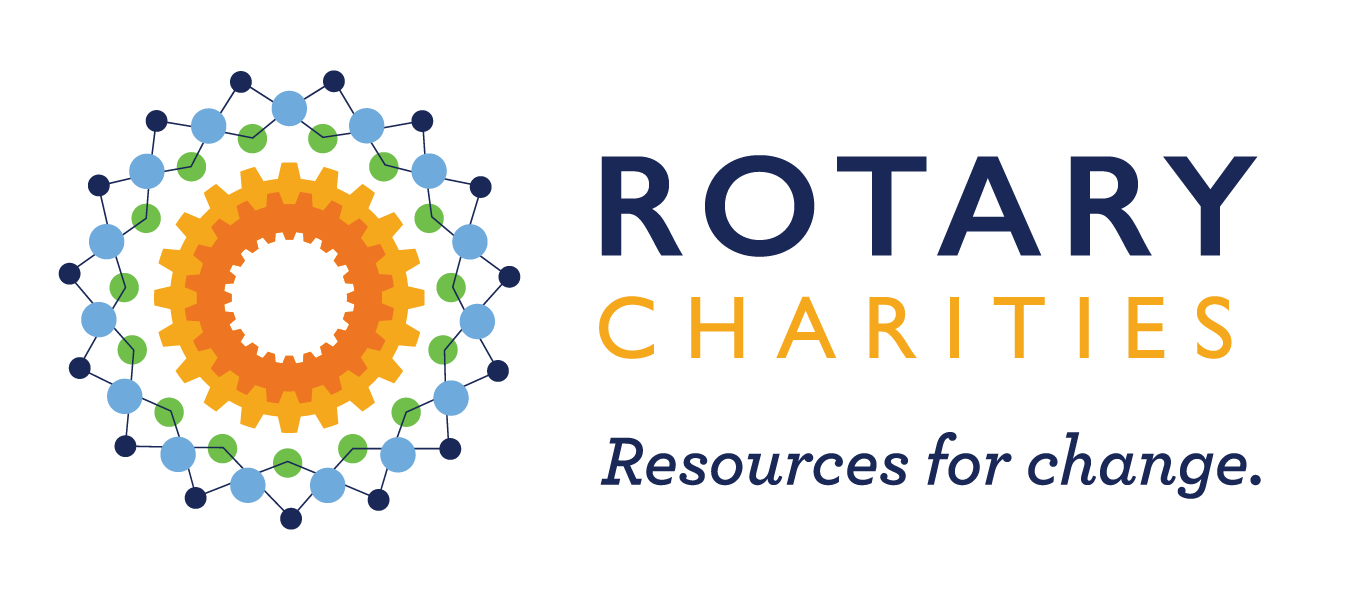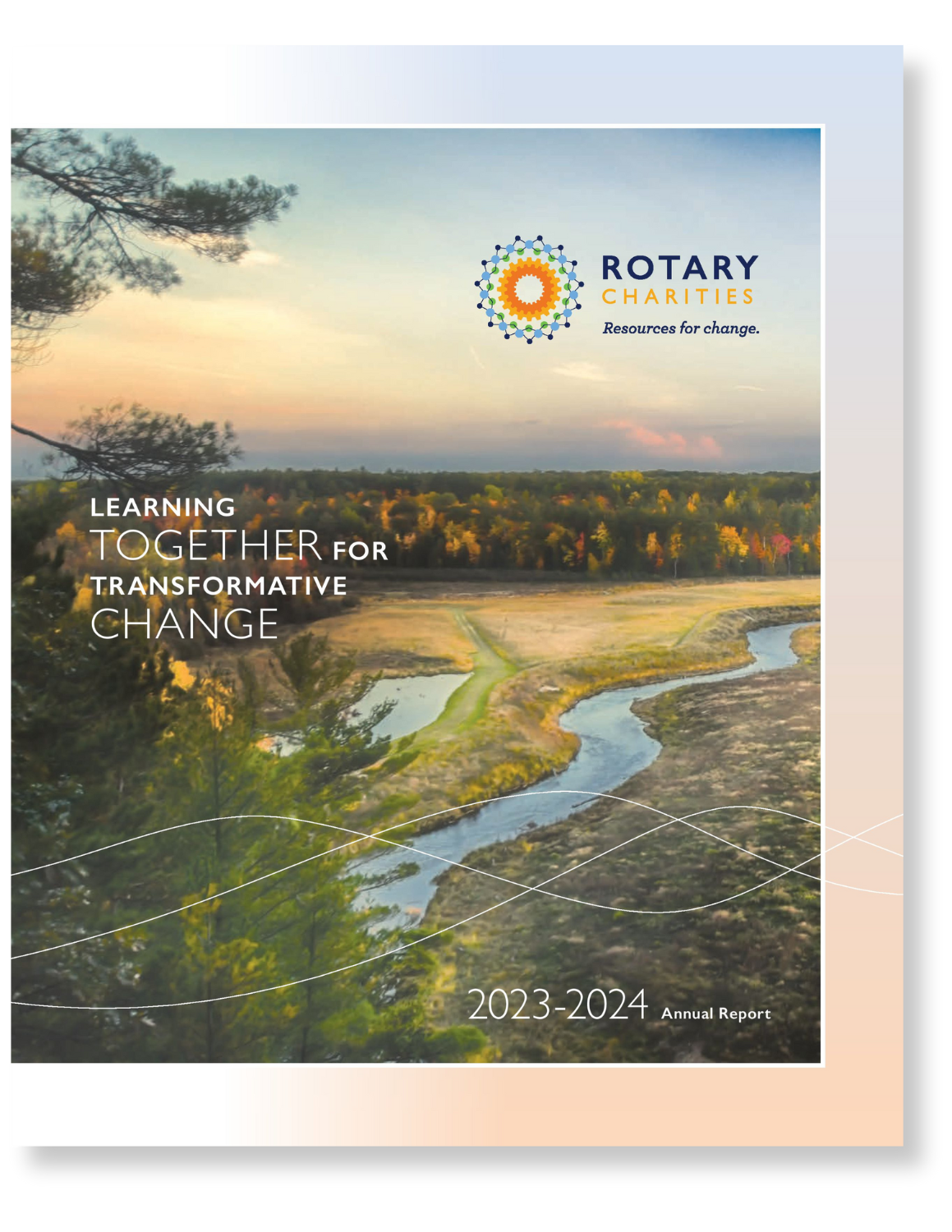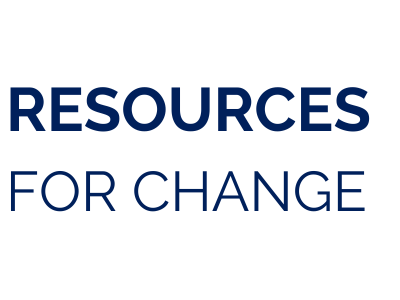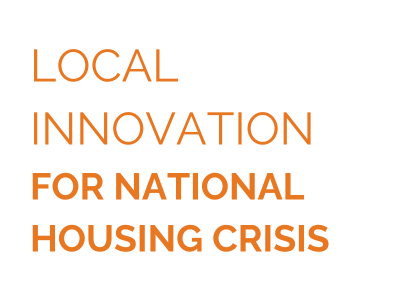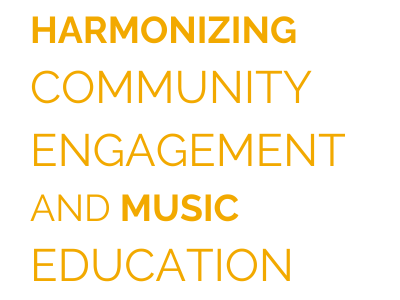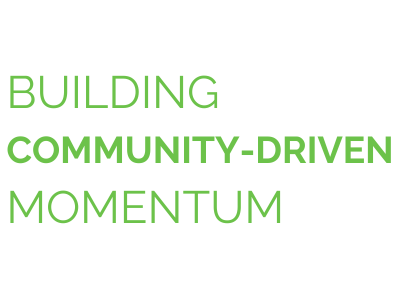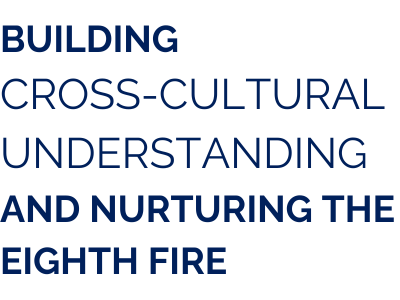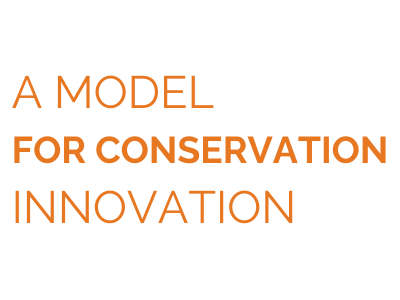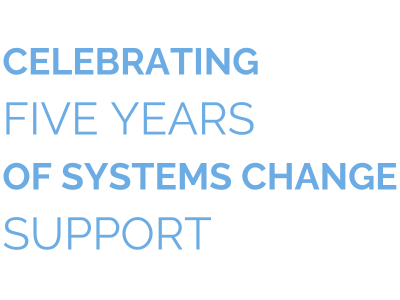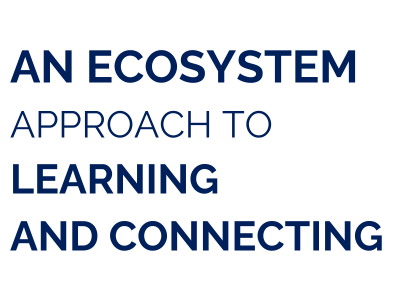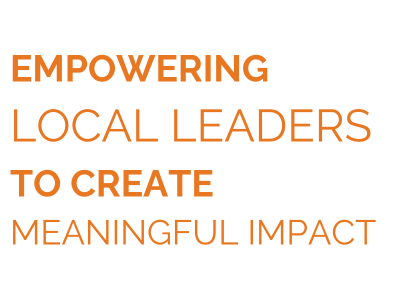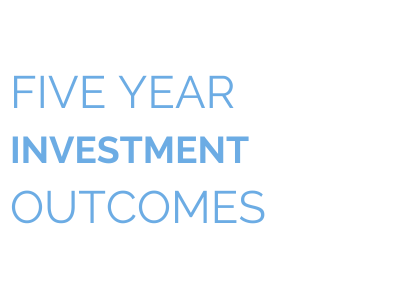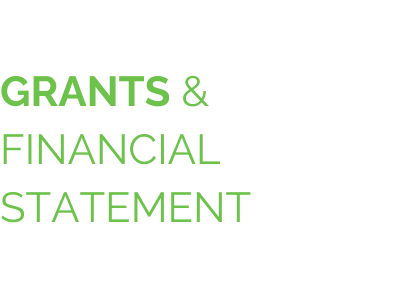TO TOP
Learning Together for
Transformative Change
This past year has been a remarkable period of growth and transformation for Rotary Charities.
In this report, we share the stories of several grantees whose work exemplifies community-driven innovation, learning, and adaptation.
We believe in “learning out loud,” and by sharing our journey and creating spaces for others to share theirs, we seek to foster a culture of openness and collaboration. With this approach, we hope to inspire and engage others in our mission to address our region’s complex problems and create community assets for all.
A letter from our Board Chairperson and Chief Executive Officer
This past year has been a remarkable period of growth and transformation for Rotary Charities. As we reflect upon the 2023-2024 fiscal year, we are thrilled to share that we have completed a comprehensive three-year strategic plan, which has been essential for setting organizational direction, navigating dynamic environments, and assessing our impact. We designed the 2021-2024 strategic plan to be adaptive and give us the flexibility to learn along the way, placing a strong emphasis on community engagement and relationship building.
We believe that our communities are made stronger through connections and collaborations in which people put service above self. Our Connecting with Changemakers series, held across our five-county service area, brought together over 400 attendees, fostering meaningful conversations and building strong relationships among local leaders, nonprofit organizations, and community members. These gatherings have provided valuable opportunities for dialogue and collaboration, helping to strengthen the fabric of our community.
In addition to our local engagement efforts, our participation in regional, national, and global conferences has helped to expand our impact and share with a broader audience. In partnership with our grantees, we presented at the Council of Michigan Foundations Annual Conference, where we discussed our strategies in rural community development and place-based systems change funding. We’ve contributed to national and global conversations as well. This year, Sakura co-chaired the program committee of the Grantmakers for Effective Organizations conference. Freya shared our approach to evaluating systems change work at the American Evaluation Association conference, and participated in a global Systems Thinking Expert Series hosted by the Early Childhood Development Action Network and the Harvard School of Public Health. These opportunities created new connections with other foundations, nonprofit leaders, and systems change practitioners from around the world, and both amplified our voice and provided valuable insights to enhance our work in the community.
In this report, we share the stories of several grantees whose work exemplifies community-driven innovation, learning, and adaptation. The Frankfort Area Community Land Trust’s unique approach to affordable homeownership and the Leelanau Conservancy’s forward-thinking conservation efforts highlight the power of local solutions to national and global challenges. Mt. Holiday’s diverse recreational programming, the Traverse City Philharmonic’s commitment to inclusive music education, and the Nurturing the Eighth Fire Team’s cultural education initiatives demonstrate the transformative impact of collaboration and community engagement.
As we move forward into our next three-year plan, we are committed to deepening our understanding of and adapting our practices and programs to meet the needs of under-represented and under-resourced groups in our region. Beyond our role as a grantmaker, we strive to be a catalyst for positive change. We will continue to build knowledge and create spaces for sharing that knowledge, with a continued focus on supporting diverse voices and inclusive communities. Our recent community Equity & Inclusion Survey has provided valuable insights, and we are already using this data to guide our efforts to incorporate the voices of the communities we serve, ensuring that our strategies are equitable and meaningful.
We believe in “learning out loud,” and by sharing our journey and creating spaces for others to share theirs, we seek to foster a culture of openness and collaboration. With this approach, we hope to inspire and engage others in our mission to address our region’s complex problems and create community assets for all.

Sakura Takano
Chief Executive Officer

Greg Luyt
Outgoing Board Chairperson
Jump to a section
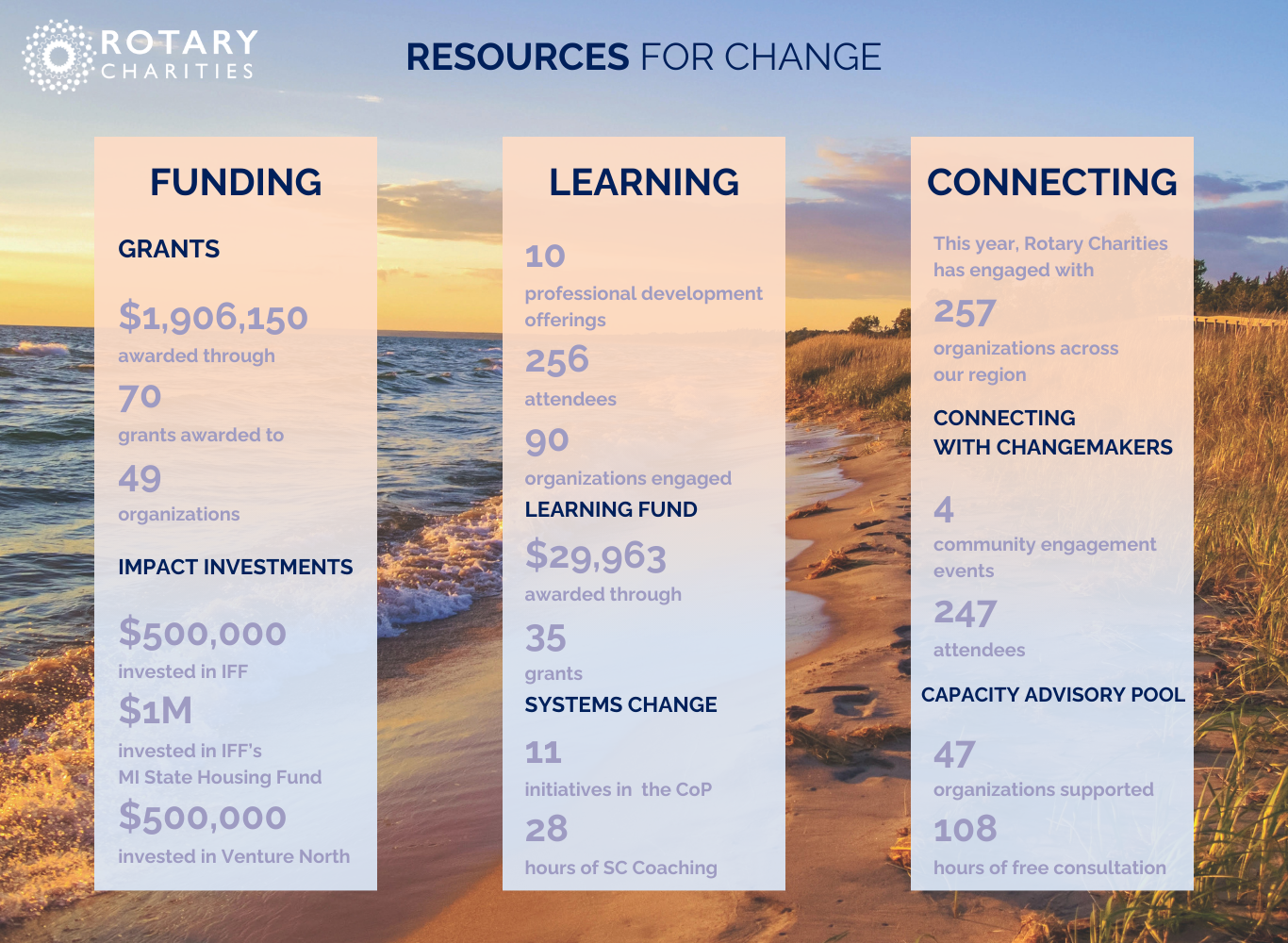
LOCAL INNOVATION FOR NATIONAL HOUSING CRISIS
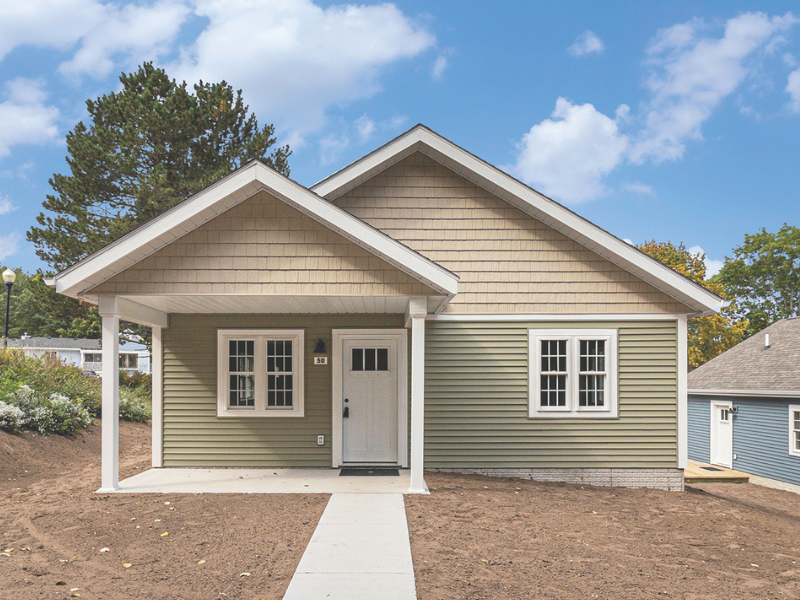
In Benzie County, housing is a pressing issue affecting the quality of life for many residents. The Frankfort Area Community Land Trust (FACLT) addresses this critical need by providing affordable homeownership opportunities for the local workforce.
By employing the Community Land Trust model, their efforts aim to ensure that essential community members, such as teachers, first responders, and service workers, can live and thrive in the area they serve by separating the ownership of the land from the ownership of the buildings. The land is held by the trust, while the homes are sold to qualified buyers at below-market rates.
FACLT’s innovative funding model involves local community members purchasing certificates of deposits at local banks, which are used as collateral for the construction loans needed to build new homes. By leveraging community trust in local banks, FACLT secures loans at low interest rates while fostering community involvement and investment in the project’s success.
The Grove Place Homes project in Frankfort has provided affordable housing to several local workers. Two homes were completed and sold in 2023—the first to a children’s librarian and food service worker, and the second to a graphic designer and grocery store department manager. Another two homes, supported by a $50,000 Assets for Thriving Communities grant, are expected to be complete in October 2024.
The success of this project has demonstrated the effectiveness of the Community Land Trust model and paves the way for future developments. FACLT plans to develop a new project on a city-owned parcel, providing up to ten additional homes. This project will adopt lessons learned from Grove Place, such as optimizing home sizes and construction methods to meet the needs of the local workforce.
“Housing is a national issue that demands local solutions. Communities need to find solutions that address their unique challenges, then leverage their available resources and collaborate to make a difference.”
Annette Knowles, Executive Director,
Frankfort Area Community Land Trust
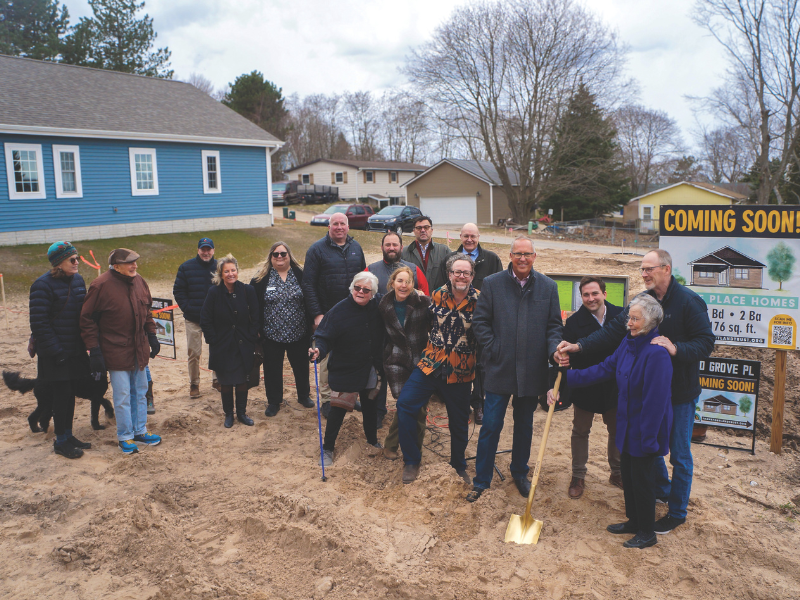
HARMONIZING COMMUNITY ENGAGEMENT AND MUSIC EDUCATION
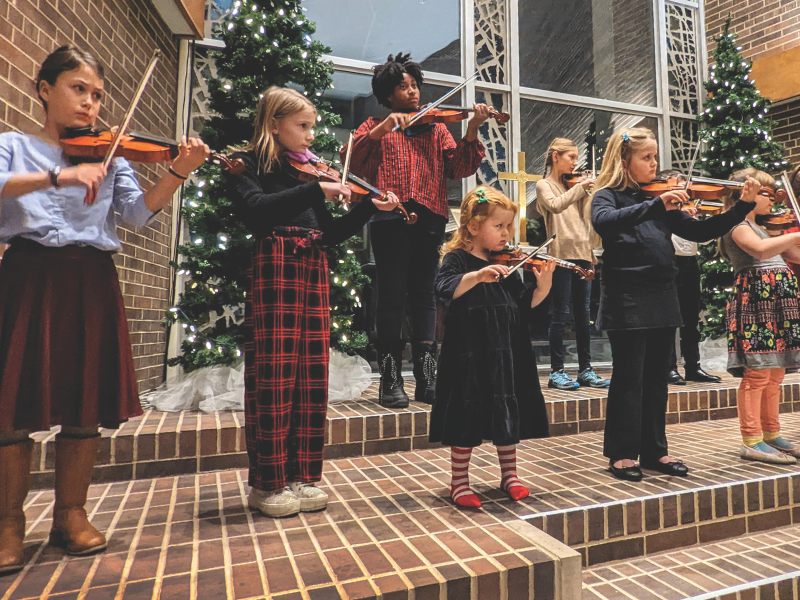
The Traverse City Philharmonic (TCPhil) plays a vital role in the cultural and educational landscape of Northern Michigan. Through creative and relevant community events and plans to establish a Community Music School, TCPhil enhances the region’s cultural vibrancy and provides music education opportunities for all ages, fostering a deeper connection between the community and the arts.
In 2020, TCPhil recognized a need for community engagement and greater access to music education. In addition to challenges intensified by the pandemic, there was growing opportunity for music education programs to nurture young talent and provide lifelong learning opportunities.
With support from a $25,000 grant in 2020, TCPhil initiated the first phase of its organizational transformation. Informed by feedback from focus groups and surveys to better understand public perception and community needs, TC Phil developed new offerings, including pop-up community concerts and virtual educational programs, making music more accessible to all. Collaborations with local organizations, such as the Traverse Area District Library, Traverse City DDA, and Interlochen Center for the Arts, expanded outreach and created inclusive programming beyond symphonic music.
Building on insights gained from their community engagement efforts, TCPhil set in motion plans for their Community Music School in 2022. Designed as a future hub for lifelong learning and community connection, the school will offer a wide range of programs, from early childhood music classes to adult ensembles. A $50,000 Assets for Thriving Communities grant has already enabled TCPhil to launch new initiatives, including the Encore Symphonic Winds ensemble and free community music offerings like Tots@TADL.
As plans for the Community Music School come to fruition, TCPhil’s commitment to learning, innovation, and adaptation ensures that it will continue to be a cultural cornerstone in Northern Michigan. By addressing the community’s needs with creativity and dedication, TCPhil not only enriches individual lives but also strengthens the entire community.
“Our community engagement efforts highlighted the need for us to diversify from just symphonic programs.
By introducing a range of educational and recreational music activities, we’ve ensured that everyone, from
young children to seniors, can find something valuable in what we offer.”
Kedrick Merwin, Executive Director,
Traverse City Philharmonic
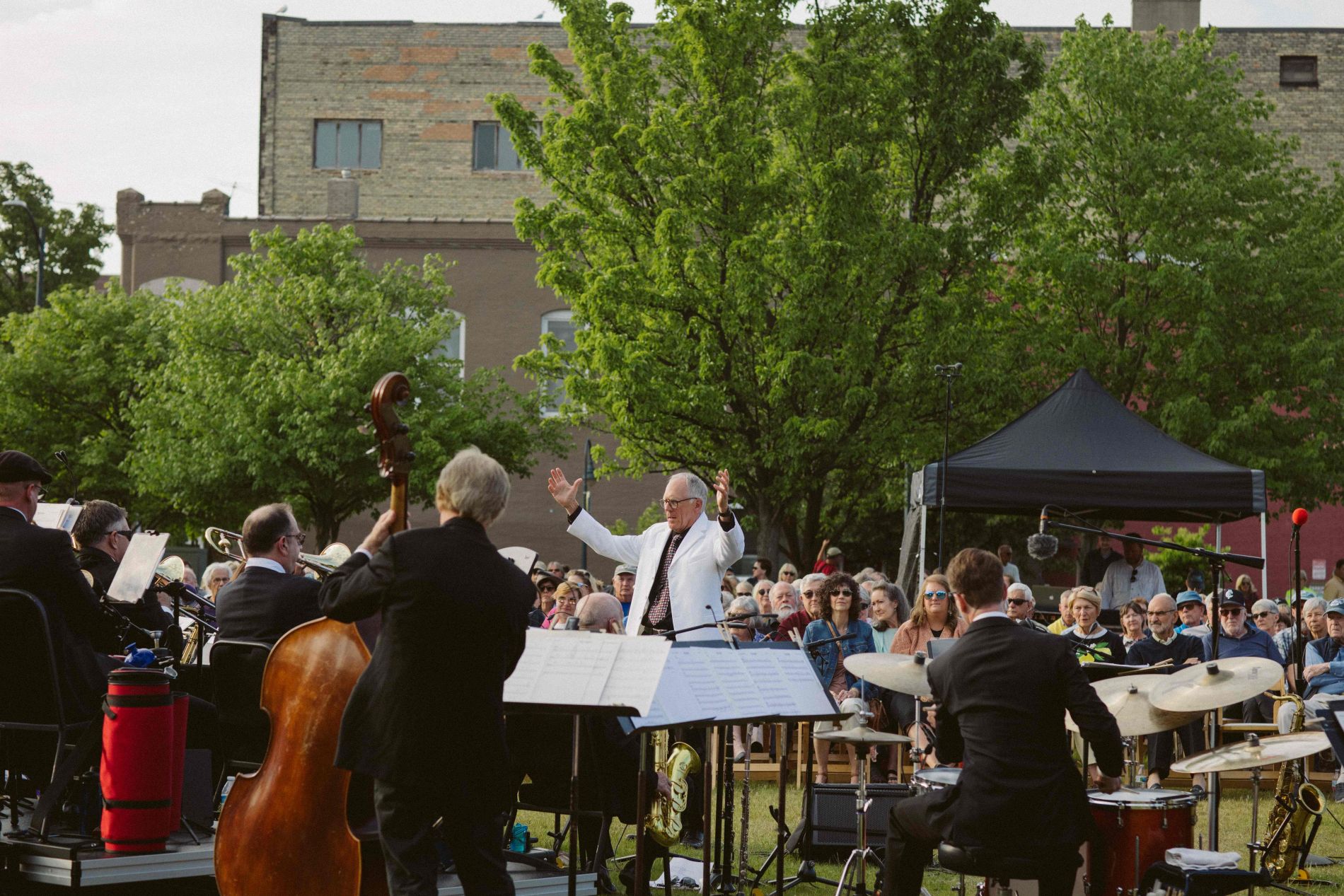
BUILDING COMMUNITY-DRIVEN MOMENTUM
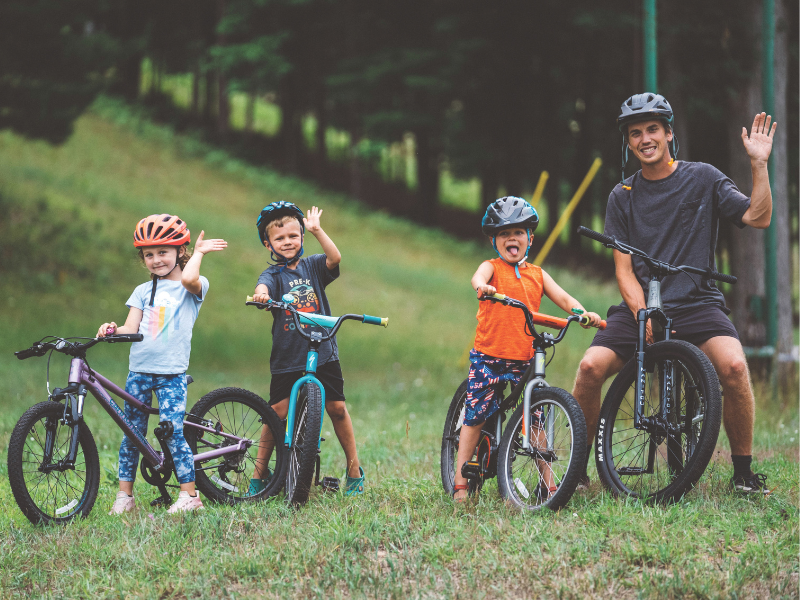
Mt. Holiday, a beloved community ski hill and outdoor recreation facility, has a long-standing history of providing affordable outdoor activities for locals and tourists alike. In recent years, the organization has focused on learning from community feedback and diversifying its offerings in the interest of remaining a vibrant community asset year-round.
In 2022, Mt. Holiday was awarded a $10,000 Seed grant to develop the Basecamp trampoline area, an initiative that emerged from the community’s growing interest in diversified outdoor activities. This new feature provides a controlled and engaging environment for youth and athletes seeking to develop skills in
freestyle biking and skiing.
Building on this momentum, Mt. Holiday received another $10,000 Seed grant in 2023 to support a comprehensive community engagement process. This initiative aimed to explore additional amenities and programs that could make the facility an attractive year-round destination. To achieve this, Mt. Holiday and its
partners gathered input from a diverse group of stakeholders, including local government officials, mountain biking enthusiasts, disability advocates, and economic development leaders.
Through town hall meetings, focus groups, and surveys, the engagement process provided valuable insights into what the community wanted for the future of the Mt. Holiday’s development. Feedback from over 60 community members helped the organization understand the various needs and preferences for biking, hiking, and other outdoor activities. This input has been critical in shaping future plans, ensuring that the programs and amenities developed would meet the community’s diverse desires.
The organization has already begun implementing some of the suggestions, such as developing new trails, opening a beer garden, and exploring the year-round use of ski lifts for mountain bikers. With the insights gained from community feedback, Mt. Holiday is well-positioned to enhance its offerings and continue growing as a four-season destination.
“We realized that to keep Mt. Holiday vibrant and relevant, we needed to diversify our activities. The trampoline project was a great start, and the feedback we received encouraged us to think about other ways we can engage the community year-round.”
Jim Pearson, Executive Director,
Mt. Holiday
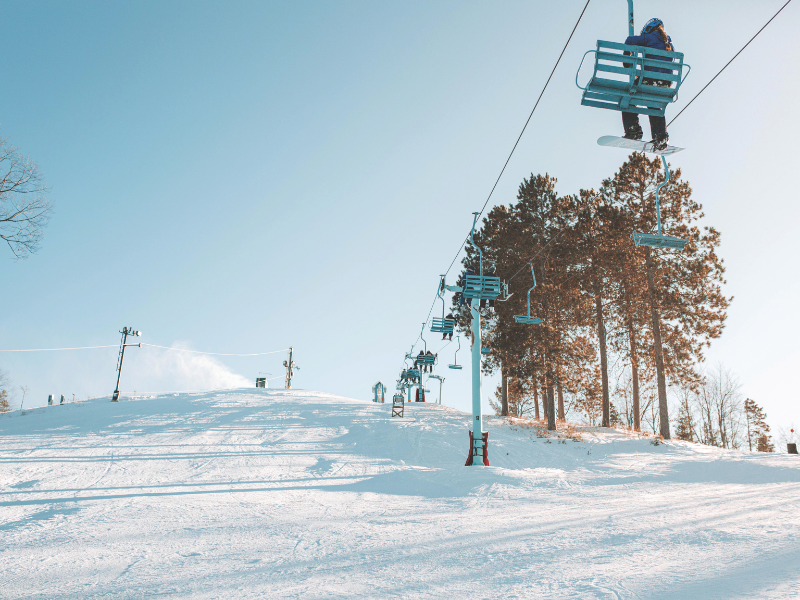
BUILDING CROSS-CULTURAL UNDERSTANDING AND NURTURING THE EIGHTH FIRE
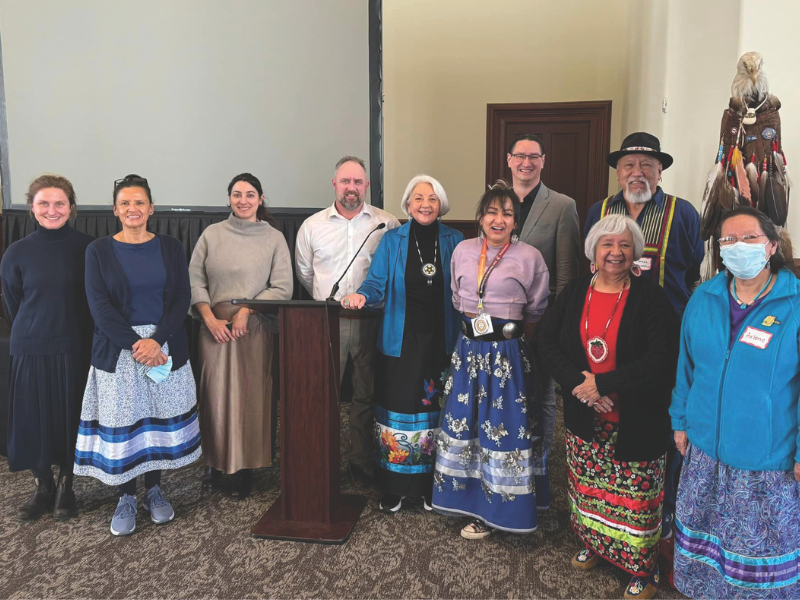
In response to increasing requests for cultural consultation from non-native communities, the Grand Traverse Band of Ottawa and Chippewa Indians (GTB) sought to establish a Cultural Services Support Team. Supported in part by a $25,000 Emerging Needs grant from Rotary Charities, this team, now known as the Nurturing the Eighth Fire Team, aims to foster cross-cultural understanding, nurture relationships, and address environmental issues.
The concept of the Eighth Fire originates from one of the Anishinaabek Seven Prophecies, which envisions a time when humanity must choose between two paths: one leading to environmental degradation and conflict, and the other to peace, harmony, and sustainability. The Nurturing the Eighth Fire Team works towards realizing the igniting of Eighth Fire by promoting cultural understanding and environmental stewardship, guiding the community towards the path of sustainability.
Throughout the year, the Nurturing the Eighth Fire Team engaged in a variety of projects and collaborations. These activities included integrating tribal cultural awareness into river restoration efforts, consulting on community development projects, hosting educational events on Anishinaabek spiritual and cultural heritage, and advocating for the recognition of the legal rights of ecosystems.
A highlight of the team's efforts was the Mino-Bimaadiziwin Summit held on January 29, 2024. This inaugural event brought together 160 attendees to learn about Anishinaabek teachings and culture. Participants expressed strong interest in building relationships with the GTB and partnering on ongoing projects. The summit featured discussions on the Anishinaabek worldview, environmental stewardship, and fostering better communication and collaboration between tribal and non-tribal communities.
The Nurturing the Eighth Fire Team's work underscores the importance of relationship building and continuous learning in addressing environmental and cultural challenges. By fostering understanding and collaboration between the Anishinaabek community and their non-tribal neighbors, the team is paving the way for a more harmonious and sustainable future. As the team continues its efforts, the principles of the Seven Prophecies will guide their work, ensuring that their actions today contribute to a better world for future generations.
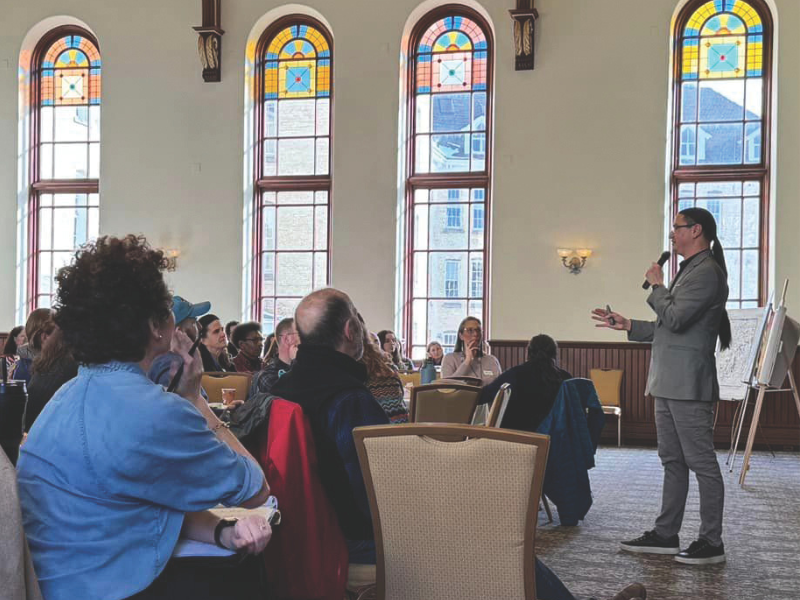
“We're trying to be the best neighbors that we can be…so it is important for us to work with the non-native people in the community to come to an understanding and agreement of what our future should look like.”
Thomas Peters, Grand Traverse Band Elder,
Nurturing the Eighth Fire Team member
“In this time of the Seventh Fire, the Anishinaabe are now speaking publicly and sharing some of our knowledge, our way of life, the teachings, in hopes that like minded non-native community members will hear what we have to say… in hopes that the Eighth Fire will be lit.”
JoAnn Cook, Grand Traverse Band Elder,
Nurturing the Eighth Fire Team member
A MODEL FOR CONSERVATION INNOVATION
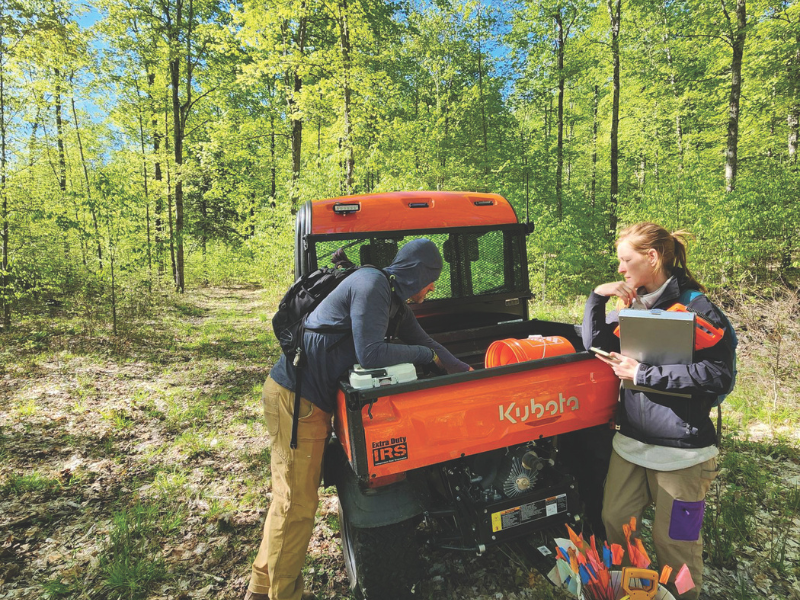
In an era of rapid environmental change, the Palmer Woods Forest Reserve exemplifies the Leelanau Conservancy’s dedication to maintaining ecological balance and fostering a deeper connection between the community and nature. As development encroaches upon Northern Michigan’s natural spaces, the need to protect sensitive ecosystems and rich biodiversity becomes increasingly urgent.
The Leelanau Conservancy (LC) addresses this challenge through strategic land acquisition and innovative ecological management. With support from a $40,000 Assets for Thriving Communities grant, LC purchased the final piece of property at the center of Palmer Woods Forest Reserve (PWFR), contributing to a continuous 1,075-acre wildlife corridor stretching to the Sleeping Bear Dunes National Lakeshore.
PWFR serves as a “forest laboratory,” where scientific inquiry and practical conservation efforts intersect. One key research initiative relates to “assisted migration,” a proactive strategy of planting tree species native to regions south of Leelanau County but expected to thrive in Northern Michigan’s future climate. By introducing these species now, LC aims to build a resilient forest capable of adapting to climate change. This research informs LC’s practices and contributes valuable insights to the broader field of ecological conservation.
Another important component is the use of deer exclosures, fenced areas that prevent deer from browsing on young saplings and other flora, allowing the understory to regenerate naturally. Initial findings show increased bird activity and healthier vegetation within these zones, highlighting the critical role of managing deer populations to promote forest health.
The research at PWFR not only addresses immediate environmental challenges but also serves as a model for other conservation efforts, demonstrating the importance of proactive and adaptive management in preserving our natural heritage. The Leelanau Conservancy’s innovative strategies ensure that Palmer Woods will continue to be a sanctuary for wildlife and a place of solace and learning for the community, now and in the future.
“Palmer Woods represents all that we strive for at the Conservancy. It is a place for recreation, science, and learning, embodying our belief that the outdoors is for everyone.”
Claire Wood, Communications Director,
Leelanau Conservancy
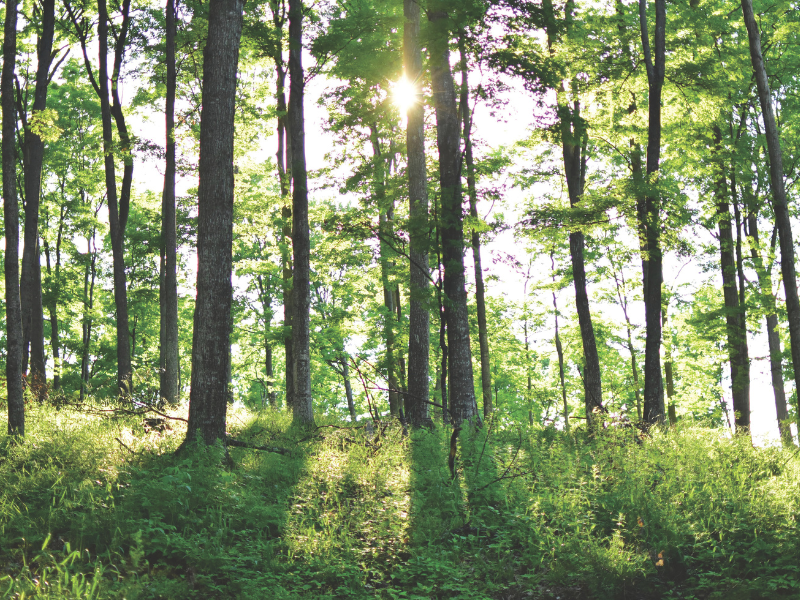
CELEBRATING FIVE YEARS OF SYSTEMS CHANGE SUPPORT
This year we celebrated five years since our first Systems Change Accelerator grants were made to catalyze transformative change in our region’s toughest problems. Since 2018, we have invested over $2.15 million in 28 collaborative systems change initiatives. Alongside these grants, we have evolved an ecosystem of support to help initiatives through the challenges inherent in this complex work.
Field Building & Connecting
As our experience in supporting systems change has grown, so have requests for us to share our learning. This year, we shared insights with foundations including the Seabury Foundation, Sisters of Charity in South Carolina, 5 Healthy Towns Foundation, and the Leelanau Township Community Foundation. We’ve reached over a thousand people through presentations to the Council of Michigan Foundations conference, Grantmakers for Effective Organizations, American Evaluation Association, and a Global Masterclass in Systems Thinking hosted by the Early Child Development Action Network and Harvard T.H. Chan School of Public Health. These opportunities have grown our networks around the world, contributed to the broader field, and provided lessons that we’re using to improve our work.
We look forward to continuing to evolve and grow our support for this challenging work.
Systems Change Coaching
All systems change-focused grantees are eligible to access free coaching from a pool with diverse expertise. This year, six initiatives received 28 hours of 1:1 coaching, making progress on challenges like:
Creating deeper alignment and coordinated action among diverse stakeholders;
Enhancing storytelling capabilities including the development of case studies, strategic messaging, and visual mapping;
Addressing equity, discomfort, and trust-building within teams and communities, utilizing cultural storytelling and participatory processes to foster inclusive environments; and
Clarifying systems change roles and communicating the significance of backbone support.

“At the end of my first CoP meeting, I remember feeling like I had ‘found my people’ and there was a lot of comfort and reassurance in knowing that my experience was typical…this gave me confidence to lean into my role and embrace the systems change process in a way that helped me feel grounded and ready to grow.”
Norika Kida Betti,
Child Caring Now
Systems Change Community of Practice
The Community of Practice is a facilitated space where current and past grantees share successes and challenges, practice with new tools and frameworks, and support one another. This year representatives from 11 initiatives gathered quarterly and explored managing conflict, systemic evaluation and learning, using love in change initiatives, and working with local, state, and Tribal governments.
Navigators Learning Circle
In an effort to increase local capacity to support systems change work, this year we convened an 8-month learning circle that included Rotary Charities staff, local consultants, and initiative conveners. Together we completed an eight-part virtual learning series from the UK-based School of Systems Change and met for in-person debriefs to consider how we might apply the learning to our local contexts. The classes deepened our shared understanding of systemic change by exploring theory and tools related to organizing, power and decision making, conflict, roles, and managing resources.
AN ECOSYSTEM APPROACH TO LEARNING AND CONNECTING
We believe that authentic connections and shared learning experiences have the potential to strengthen our community bonds.
Beyond funding, we provide comprehensive support designed to meet the unique needs of changemakers and their organizations. By weaving together diverse learning opportunities and fostering deep connections, we aim to cultivate an ecosystem where changemakers have access to the tools, resources, and expertise they need to thrive.
As we move forward, we will continue to listen to our community and refine our offerings to ensure that they remain responsive and relevant in an ever-changing landscape.
Capacity Advisory Pool
The Capacity Advisory Pool (CAP) has continually evolved since its creation in 2020 as the "Crisis Response Team," becoming an integral part of our support system that offers customized consultation services at no charge to the recipients. CAP consultants are experts in their fields, providing guidance to help organizations build their capacity and offer foundational support. This year, we supported 180 hours of consultation to 47 organizations, addressing challenges over a broad spectrum of topic areas. Feedback from recipients has been instrumental in shaping the CAP, encouraging us to add new consultants and expand our services to meet emerging needs.
Professional Development Workshops
Our professional development workshops provide a space for organizations to navigate challenges and innovate solutions. By leveraging both virtual and in-person formats, we reached a broad audience while also fostering deeper connections through intimate, face-to-face gatherings. Informed by feedback from participants, CAP consultants, and our Systems Change Coaching partners, we purposefully designed 10 workshops to equip organizations with the essential skills and knowledge needed to thrive and engaged 256 attendees from 90 different organizations. Our five-part Board Development series was a standout offering, with 143 participants engaging in sessions designed to explore the critical role board members play in the success of nonprofit organizations.
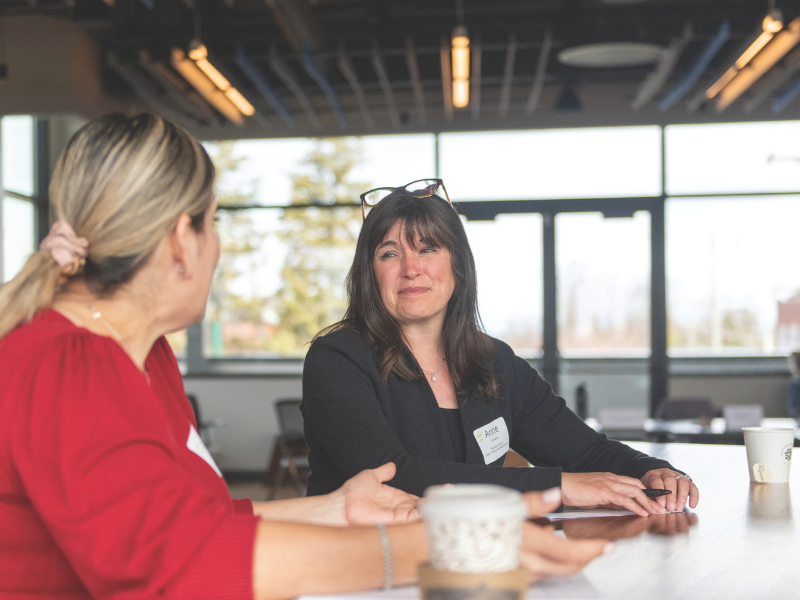
“The consultant played a pivotal role in helping us to approach our strategies and objectives with a fresh perspective. The collaborative process encouraged innovative thinking and problem-solving, guiding us to approach our challenges and goals from angles we hadn't previously considered. Their involvement not only brought new ideas to the table but also helped in refining our existing strategies, making them more robust and adaptable to the changing landscapes of our field.”
CAP Support Recipient
Learning Fund
The Learning Fund continues to be instrumental in helping organizations address their specific needs and invest in their growth and development. This year, we awarded $29,963 through 35 grants, supporting a diverse range of topics, including diversity, equity, and inclusion, collaboration, technical skills, and board training. These grants enabled organizations to access vital training and development opportunities that they might not otherwise afford, ensuring that they can continue to build their capacity and enhance their impact.
Fund Development Cohort
The Fund Development Cohort, a partnership between Rotary Charities and Northwestern Michigan College (NMC), offers advanced training for nonprofit fundraising professionals. The curriculum addresses key fundraising challenges with a comprehensive, adaptable framework in a space where participants can share experiences and learn from industry experts. Over eight seasons, more than 80 participants have enhanced their skills and led impactful fundraising initiatives.
This year, responding to alumni and community feedback, Rotary Charities and NMC launched the Executive Director & Board Fund Development Cohort Pilot. This two-day intensive program was designed to enhance alignment and understanding between executive directors and board members.
"The Learning Fund made it possible for me to attend a conference that truly impacted not only my work, but my mindset. It also makes me feel valued that Rotary would support me in this important work."
Bailey Nuss, Learning Fund Recipient
United Way of Northwest Michigan
EMPOWERING LOCAL LEADERS TO CREATE MEANINGFUL IMPACT
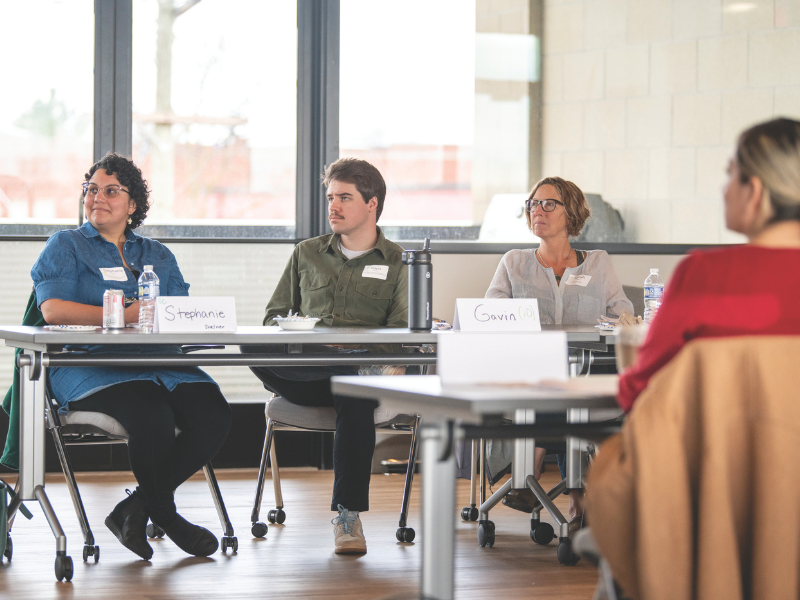
Effective leadership is a cornerstone of building thriving communities. Rotary Charities is dedicated to empowering local leaders through comprehensive programs designed to enhance their skills and catalyze positive community change. Two flagship programs, the Leadership Learning Lab (LLL) and the Leadership Coaching Cohort (LCC), offer distinct yet complementary approaches to leadership development as changemakers explore new ideas, adapt to changing circumstances, and effectively guide their organizations toward meaningful impact.
Leadership Learning Lab
The Leadership Learning Lab is a ten-month program that helps changemakers develop adaptive leadership skills through a blend of monthly learning sessions, individual reflection, small group learning pods, and ongoing support. The LLL focuses on creating a community of leaders who share a common language and framework for addressing complex challenges.
This year, the Leadership Learning Lab welcomed 66 leaders from across northern Michigan, including 14 from our five-county region. Essential leadership topics such as time management, board development, diversity, equity, inclusion, and belonging, and mission-driven storytelling, offer participants valuable insights and practical tools to enhance their leadership capabilities.
Leadership Coaching Cohort
The Leadership Coaching Cohort offers a personalized experience, providing 1-on-1 coaching with Lucille Chrisman, a certified executive coach with over 30 years of experience. Lucille’s coaching philosophy centers on creating a safe, confidential environment where leaders can explore their strengths, identify areas for growth, and develop actionable strategies to achieve their personal and professional goals.
This year, 21 local leaders from diverse backgrounds and organizations participated in the cohort, often describing their experience with Lucille as “transformative.” They reported significant growth in their leadership capabilities, including improved decision-making, strategic thinking, and effective communication.
"The Leadership Coaching Cohort was truly transformative for me. The one-on-one coaching sessions provided personalized support that helped me identify my strengths and build confidence. The cohort environment allowed me to connect with other local leaders, fostering a network of support and shared learning. This experience has not only made me a more effective leader but also deeply enriched my personal growth."
Jennifer Hricik
Leadership Coaching Cohort, Fall 2023
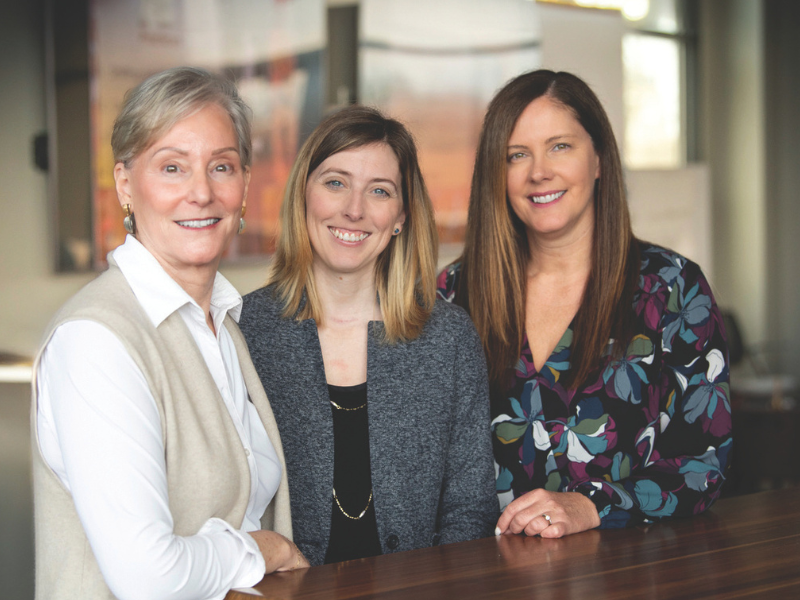
FIVE YEAR IMPACT INVESTMENT OUTCOMES
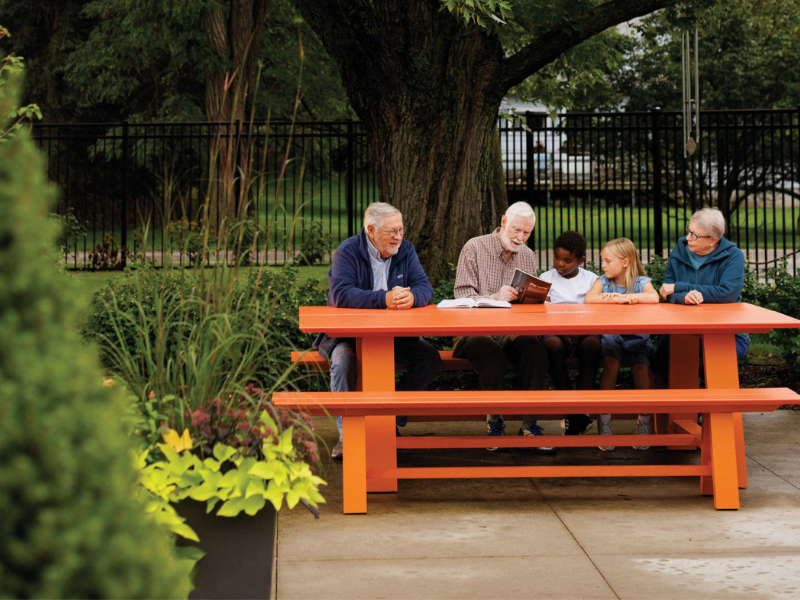
We reached a 5-year milestone in our Impact Investing program, through which we aim to create access to new sources of capital to provide social benefits to the community and inspire others to join us in leveraging our assets for greater philanthropic impact.
One of our significant impact investments has been in IFF, a Community Development Financial Institution based in Chicago, which provides below-market rate loans to nonprofit human service and community development agencies for acquiring, constructing, and renovating facilities across the Midwest.
In 2023, we increased our investment in IFF from $500,000 to $1,500,000. This decision was driven by the transformational impact of IFF’s investments in the region, which have yielded $8,500,000 in new capital to support $24,400,000 in total project costs. IFF’s regional projects have included early childhood center development, teacher-focused housing, and multi-family housing development.
Our increased $1,000,000 investment is dedicated to supporting IFF’s newly formed Michigan State Housing Fund. This coordinated funding strategy involves collaboration with the Grand Traverse Regional Community Foundation and the Frey Foundation, with the goal of enhancing housing solutions and supporting community-driven development projects.
As these investments continue to grow, they will play a crucial role in supporting sustainable and equitable development across the region.

GRANTS & FINANCIAL STATEMENT
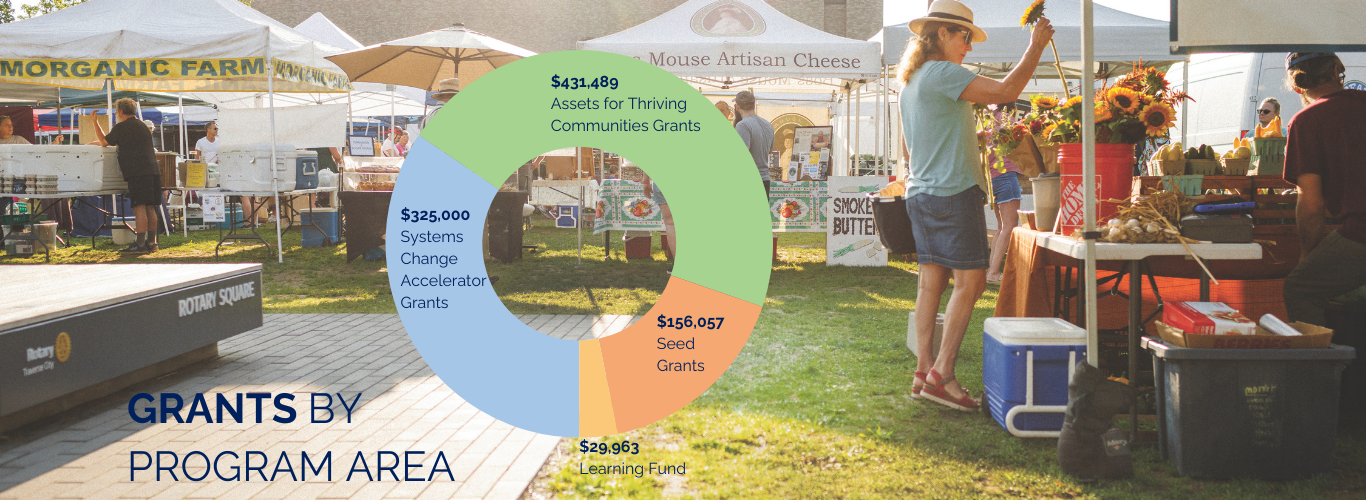
GRANTS BY PROGRAM AREA
Click here to see Grants by Program Area
STATEMENT OF ACTIVITIES
| FY 2024 | FY 2023 | |
|---|---|---|
| Net Assets, beginning of year | 46,353,295 | 45,350,019 |
| REVENUE AND GAINS | ||
| Consulting fees | 55,009 | 13,598 |
| Investment return, net of investment fees | 4,473,753 | 3,799,589 |
| Oil and gas royalty income | 161,132 | 328,757 |
| Grants and Other | 85,745 | 95,103 |
| TOTAL REVENUE AND GAINS | 4,775,639 | 4,237,047 |
| OPERATING EXPENSES AND GRANTS | ||
| Program Services | 2,948,943 | 3,072,753 |
| Management and general | 170,777 | 161,018 |
| TOTAL OPERATING EXPENSES AND GRANTS | 3,119,720 | 3,233,771 |
| Change in net assets without donor restrictions | 1,581,334 | 917,471 |
| Change in net assets with donor restrictions | 74,585 | 85,805 |
| TOTAL CHANGE IN NET ASSETS | 1,655,919 | 1,003,276 |
| Net assets without donor restrictions end of year | 48,009,214 | 43,353,295 |
| Net assets with donor restrictions end of year | - | - |
| TOTAL NET ASSETS END OF YEAR | 48,009,214 | 46,353,295 |


